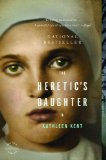Summary | Excerpt | Reading Guide | Reviews | Beyond the Book | Readalikes | Genres & Themes | Author Bio

A Novel
by Kathleen KentChapter One
Massachusetts, December 1690
THE DISTANCE BY wagon from Billerica to neighboring Andover is but nine miles. For myself it was more than a journey away from the only home I had ever known. It was the ending of a passage from the dark fog of infancy to the sharp remembrances of childhood. I was nine years of age on that December day and my entire family was going back to live with my grandmother in the house where my mother was born. We were six in all, cramped together in an open wagon, carry ing within my mother and father, two of my older brothers, myself, and Hannah, who was but a baby. We had with us all of our house hold possessions. And we were bringing, unbeknownst to any of us, the smallpox.
A plague of it had swept across the settlements of Middlesex County, and with our crossing east over Blanchard's Plain, contagion and death followed with us. A close neighbor, John Dunkin of Billerica, had died within the space of one week, leaving a widow and seven children. Another neighbor brought us the news, and before the door could close on the messenger, my mother had started packing. We had thought to outrun the pox this time. My father had bitter memories of being blamed for bringing the pox into Billerica many years before. He always said it was because he was a Welshman and a stranger to the town, even after living there for so many years, that he stood accused. But the disease crept along with us like a pariah dog. It was my older brother Andrew who would be the first to succumb. He carried the seeds of sickness within him, and from him it would spread to our new town of residence.
It was deep into the season and so bitterly cold, the liquid from our streaming eyes and noses froze onto our cheeks like frosted ribbons of lace. All of us had dressed in every bit of clothing that we possessed and we pressed tightly together for warmth. The crudely hewn boards of the wagon had been covered with straw, and my brothers and I had wrapped it around us as best we could. The draft horse labored under his load, for he was not a young gelding, and his breath steamed in great puffs into the air. His coat was as woolly as any bear's and encrusted with a forest of icicles that hung down sharply from his belly. Richard, my oldest brother, was not with us. He was near a man at sixteen and had been sent ahead to help ready the house for our arrival, bringing provisions strapped across the back of our one remaining ox.
Father and Mother sat at the front of the wagon silent, as was their habit. They rarely spoke to each other in our presence and only then of weights and mea sures and time delineated by the seasons. The language of field and home. He often deferred to her, which seemed remarkable, as he towered over my mother. Indeed, he towered over everyone. He was close to seven feet tall, so it was said, and to me, being a small child, his head seemed to rest in the clouds, his face forever in shadow. He was forty- eight years of age when he married my mother, so I had always thought of him as an old man, even though he carried himself erect and was fleet of foot. Thomas Carrier, so the gossip went, had come from old England as a young man to escape some troubles there. As my father never spoke of his life before marrying, and for truth said hardly a word regarding anything at all, I did not know his history before he plied his trade as farmer in Billerica.
I knew only two things for certain of his past. The first was that my father had been a soldier during the civil wars of the old England. He had a red coat, old and battered and faded to rust, which he had brought with him from London. One arm was torn, as though slashed through with something sharp, and Richard had told me that, but for the padded lining in the sleeve, Father would have lost an arm for sure. When I pressed Richard for more of the story as to how and where Father had fought, my brother would purse his lips and say, "Ah, but you're only a girl and cannot know the ways of men." The other thing I knew was that men feared him. Often behind my father's back they would gesture secretly to one another a peculiar signal. A thumb passed over the neck from one side to the other as if to sever their heads from their bodies. But if Father ever saw these gestures, he gave them no notice.
Copyright © 2008 by Kathleen Kent
The good writer, the great writer, has what I have called the three S's: The power to see, to sense, and to say. ...
Click Here to find out who said this, as well as discovering other famous literary quotes!
Your guide toexceptional books
BookBrowse seeks out and recommends the best in contemporary fiction and nonfiction—books that not only engage and entertain but also deepen our understanding of ourselves and the world around us.